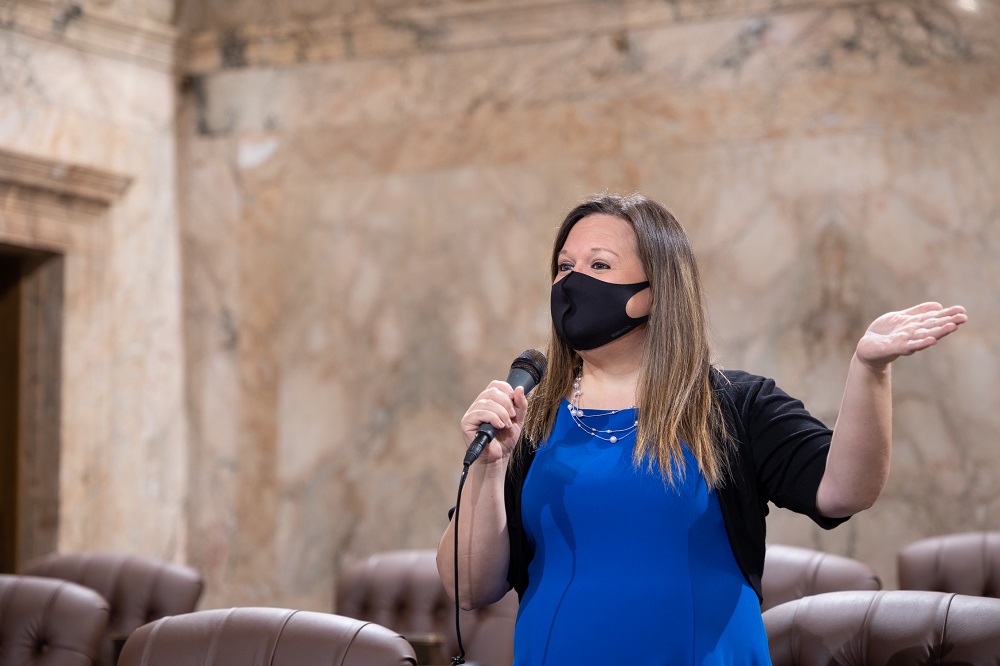Dear Friends and Neighbors,
The end of the legislative session is fast approaching. The Legislature adjourns Sine Die on Thursday, March 10th. This week we are working hard to get as many policies that benefit the people of Washington across the finish line as possible.
Bills Alive Update!

With only seven days left in this year’s legislative session, many bills have already failed to clear a legislative “cutoff” and will not pass this year. However, several bills that I sponsored are still moving through the legislative process. The following bills are awaiting floor action in the Senate:
HB 1616: Charity Care
Status: Passed the House on February 2nd with a vote of 63-33. Awaiting a vote on the Senate floor.
The high cost of healthcare is one of the largest drivers of bankruptcy in our country. Nationally, over two-thirds of people who file for bankruptcy cite medical issues as a key contributor. To help alleviate this problem, Washington has a charity care law that requires hospitals to forgive some or all of the out-of-pocket costs of essential health care for low-income patients who qualify.
HB 1616 standardizes and expands eligibility for charity care. Hospitals will have to provide full write-offs of out-of-pocket expenses for people making up to 300% of the federal poverty level and provide partial write-offs for those who make up to 400% of the FPL. This will expand access to free or reduced healthcare to 2.2 million Washingtonians.
HB 1412: Legal Financial Obligations
Status: Passed the House on February 10th with a vote of 70-24. Awaiting a vote on the Senate floor.
Legal financial obligations (LFOs) are fines, fees, costs, and restitution that people with criminal convictions must pay as a part of their sentence. Unfortunately, for people without the ability to pay, they can create significant barriers to reentry. Formerly incarcerated people already face barriers to employment, education, and housing. On top of that, LFOs can trap those unable to afford them in a lifelong cycle of debt. Not only does this prevent those people from successfully reintegrating into society, but it also wastes the state’s resources as we try to collect money that will never exist.
HB 1412 recognizes that trapping people in a debt cycle only increases recidivism and allows judges to waive or reduce a person’s LFOs based on their inability to pay them. Not only will this remove significant barriers to reentry, but it will reduce the racial disparities in Washington’s criminal legal system. People of color are sentenced to pay LFOs more often and at higher rates than white people. The bill also sets up a fund to ensure victims’ services are not impacted.
HB 1818: Promoting Successful Reentry and Rehabilitation
Status: Passed the House on February 12th with a vote of 87-10. Awaiting a vote on the Senate floor.
Currently, the Department of Corrections is only allowed to provide housing vouchers for people leaving incarceration for three months. This is often not enough time for a person re-entering society to get on their feet, find a job, and become a stable member of society. Unfortunately, this often results in formerly incarcerated people becoming homeless. Not only does this increase their chance of recidivism and decrease their chance of finding stable employment, but it also creates a public safety risk for our communities.
We should be working to set people rejoining our communities up for success, not putting barriers in their way. HB 1818 tackles this problem by extending the time that DOC can provide housing vouchers from three to six months, removing barriers to the DOC providing housing assistance, and eliminating fees that only serve to prevent successful re-entry into the community.
Saving Lives Through Prescription Drug Language Access

Understanding health care information is vital for patients’ health. For prescription drugs, following the exact directions can be a matter of life or death. Accidentally taking the wrong dose, taking the right medication at the wrong time, or eating the wrong foods while on certain medications can have life-threatening consequences.
That is why it is vital that prescription labels are accessible to our neighbors who don’t speak English as their primary language. Clearly translating these directions isn’t a trivial courtesy – for many people, it is life or death.
That is why I am proud to have supported House Bill 1852, requiring the Pharmacy Quality Assurance Commission to create rules for translating drug labels and information. This policy starts to build a structure to ensure language access throughout the healthcare system and will help us save lives here in Washington
Building Our Behavioral Health Capacity to Support Public Safety

Last year, following the Supreme Court ruling that invalidated Washington’s statute on simple narcotics possession, the Legislature made a choice to end the expensive and harmful felony for possession model and instead build up our behavioral health system to focus on treatment, care, and recovery. Instead of crowding jails, we are building up a system which connects people wanting help with case managers, stable housing, the treatment they need to recover with compassion, and the support to be successful. This year’s budget invests heavily in this vision. Some of those investments include:
- $28 million to fund housing and employment for individuals struggling with behavioral health issues
- $27 million for expanded opioid response programs and supports
- $29 million to fund crisis, outreach, and diversion programs
- $51 million to increase the rates for mental health and substance use disorder providers
- $100 million for behavioral health providers that were impacted by COVID and are desperate for financial assistance to stay in operation
Decades of putting people in jail isn’t working and we are failing our loved ones, neighbors, and communities that are struggling with the impacts of substance use disorder. It’s time to try something different. Last year’s budget and this supplemental budget begin the work of building a behavioral health system focused on treatment and recovery support. Importantly, not only is treatment and outreach funded but intensive case management and housing. By building a system that provides support from pre-treatment through recovery we are offering people a hand up, not handcuffs. Everyone in our state will benefit from this more effective and humane approach to behavioral health.
Sincerely,
![]()
Rep. Tarra Simmons
